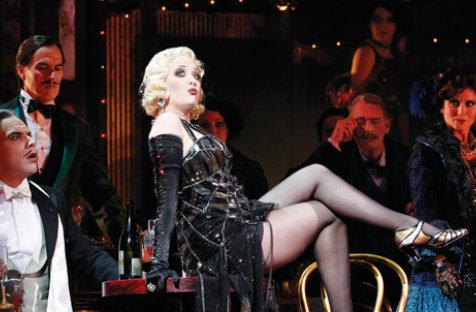Puccini’s La Bohème is often described as the perfect first-time opera. It’s got the great romance, the hummable tunes and some comic moments as well as the obligatory operatic tragedy. But the opera’s crowning glories are its lovable central characters – Mimi and Rodolfo. These lovers are real and easy to identify with; their emotions simple yet profoundly deep.
Any production of La Bohème stands or falls on its ability to bring these two characters to life. As Gordon Kerry says in the program notes for this production, ‘[when La Bohème is] well sung and acted … it never leaves the listener unmoved.’
From the moment Nicole Carr’s supposedly consumptive Mimi emerges on stage with a ridiculous grin on her face, it’s clear the acting in Gale Edwards’ production is going to present a huge stumbling block to any tugging of the heartstrings. And, if Gianluca Terranova’s Rodolfo seemed a little awkward skylarking with his mates at the beginning of Act I, it’s nothing to his embarrassing attempts at seduction later on. Not that his clumsiness matters, for Carr’s Mimi is – unlike the shy Mimis we’re used to seeing – a pushover.
Edwards has given the most emotive scenes in this opera a strange, soap opera fluorescence, before which all the depth and fiery tension in Puccini’s passionate music melts away. Terranova’s tenor is smoothly beautiful, but lacks warmth and darkness while Carr’s soprano rings out lively but untender. Meanwhile the Australian Opera and Ballet Orchestra, under the baton of Christian Badea, sometimes seem to be merely going through the motions.
Everything about this production is oversized, so that all the subtlety is subsumed. Instead of a cramped attic room, Rodolfo and Marcello share a giant warehouse space. Set Designer Brian Thompson has also transformed Act II’s street Cafe Momus into an overwhelmingly opulent cabaret (we’re in 1930’s Berlin), where the intrusion of the street children from outside appears bizarre.
Despite the awkward direction, much of the supporting cast still manage to shine. Samuel Dundas’s Marcello is vocally compelling and a stand-out actor – utterly convincing, whether as one of the boys or in his tortured desire for Musetta. David Parkin and Shane Lowrencev are both in fine voice as Colline and Schaunaud, but Lowrencev’s highly camp character is unfortunately given far too little to do apart from a gratingly silly laugh.
Lorina Gore exudes sex appeal as a beautifully energetic Musetta, but her fabulous ‘Quando me’n vo’ (‘When I go along’), played as a cabaret number, is overshadowed by the crowded set.
Despite its numerous shortcomings, the La Bohème audience were extremely enthusiastic on opening night. Opera is often about the spectacle and this production delivers. Just don’t expect subtlety, and there’s not much call for tissues.
Rating: 2 ½ stars out of 5 stars
Opera Australia presents
La Bohème
By Giacomo Puccini
Directed by Gale Edwards
Starring Gianluca Terranova, Nicole Carr, Lorina Gore, Samuel Dundas, David Parkin, Shane Lowrencev
Joan Sutherland Theatre, Sydney Opera House
31 December 2012 – 23 March 2013





